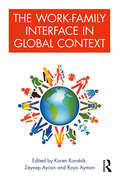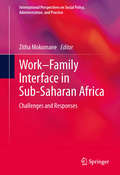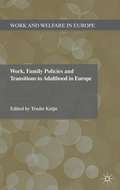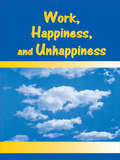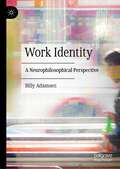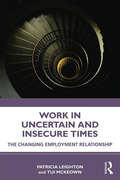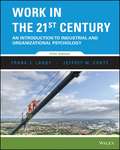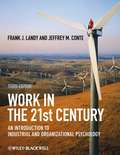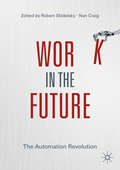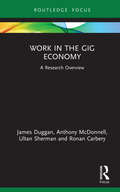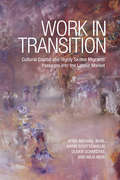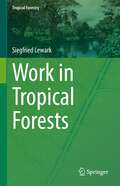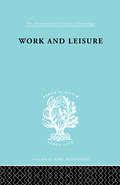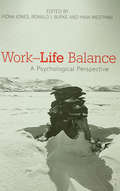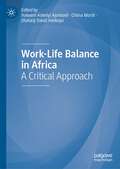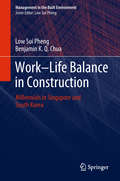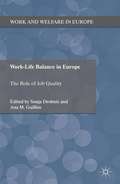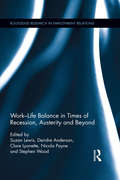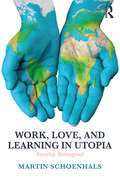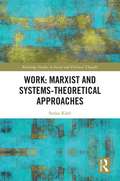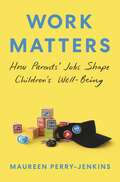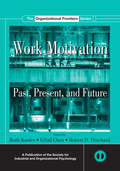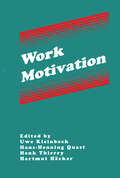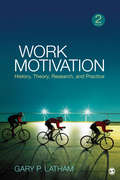- Table View
- List View
The Work-Family Interface in Global Context
by Karen Korabik Zeynep Aycan Roya AymanBased on a sweeping, ten country study, The Work-Family Interface in Global Context comprises the most comprehensive and rigorous cross-cultural study of the work-family interface to date. Just as work-family conflict is associated with negative consequences for workers, organizations, and societies, so too can the work and family domains interact positively to enhance or enrich one another. Drawing on qualitative, quantitative, and policy-based data, chapters in this collection explore the influence of culture on the work-family interface in order to help researchers and managers understand the applicability of work-family models in a variety of contexts and further conceptualize work-family interactions through the development of a more universal knowledge. Members of the Project 3535 Team: Karen Korabik, University of Guelph, Canada.Zeynep Aycan, Koç University, Turkey.Roya Ayman, Illinois Institute of Technology, USA.Artiawati, University of Surabaya, Indonesia.Anne Bardoel, Monash University, Australia.Anat Drach-Zahavy, University of Haifa, Israel.Leslie B. Hammer, Portland State University, USA.Ting-Pang Huang, Soochow University, Taiwan.Donna S. Lero, University of Guelph, Canada.Tripti Pande-Desai, New Delhi Institute of Management, India.Steven Poelmans, EADA Business School, Spain.Ujvala Rajadhyaksha, Governors State University, USA.Anit Somech, University of Haifa, Israel.Li Zhang, Harbin Institute of Technology, China.
Work-Family Interface in Sub-Saharan Africa
by Zitha MokomaneProblems associated with work-family conflict do not belong to individual families alone, but have a major social and economic impact on the greater community. This scenario also holds true across sub-Saharan Africa, as nations enter the global economy and rising numbers of women enter the workforce. One of the first resources to focus on this region, Work-Family Interface in Sub-Saharan Africa probes rarely-studied dimensions of conflict between paid employment and family responsibilities. It balances theoretical background, empirical findings and current and emerging interventions for an insightful and practical review of ongoing issues affecting working women with families. Coverage contrasts concepts of work and family between the developing world and the West and related social concerns such as gender expectations and sexual harassment are examined in the work context. The book describes a range of family strategies for resolving work-family friction and chapters end with policy recommendations as first steps toward remedying longstanding challenges. Among the thought-provoking dispatches: Ghana: Managing work and family demands Nigeria: Strain-based family interference with work Botswana: The social impact of job transfer policy on dual-career families Kenya: The role of household help in work-family balance South Africa: State measures toward work-care integration Zambia: The quest for a family policy As evinced by these chapters, progress is gradual and far from uniform. As a guide for future study and future policy, Work-Family Interface in Sub-Saharan Africa is a substantial reference for sociologists, public health professionals, public and social policymakers and administrators.
Work, Family Policies and Transitions to Adulthood in Europe
by Trudie KnijnThis book analyzes how the current generation of young adults enters the labour market and tries to create their own autonomous household, with or without children, exploring questions such as what does it mean to be a young adult in Europe today and what social policies help them to combine work and family life?
Work, Happiness, and Unhappiness
by Peter WarrAward-winning psychologist Peter Warr explores why some people at work are happier or unhappier than others. He evaluates different approaches to the definition and assessment of happiness, and combines environmental and person-based themes to explain differences in people’s experience. A framework of key job characteristics is linked to an account of primary mental processes, and those are set within a summary of demographic, cultural, and occupational patterns. Consequences of happiness or unhappiness for individuals and groups are also reviewed, as is recent literature on unemployment and retirement. Although primarily focusing on job situations, the book shows that processes of happiness are similar across settings of all kinds. It provides a uniquely comprehensive assessment of research published across the world. Initial chapters explore the several meanings of happiness and the ways in which those have been measured by psychologists. The construct includes pleasure, satisfaction and subjective well-being, and unhappiness has been studied in terms of dissatisfaction, strain, anxiety, and depression. The impacts of principal environmental features on these experiences are reviewed through an analogy with vitamins in relation to physical health—beneficial only up to a point. However, environmental effects are not fixed. Influences on happiness from within the person are examined in terms of principal thinking patterns, personality styles, and cultural backgrounds. Differences are explored between groups (men and women, older and younger people, employees who are full-time and part-time, and so on), and processes of person-environment fit are placed within an overall framework which emphasizes the impact of variations in personal salience. The book is written primarily for academic readers, including senior undergraduates, graduate students, teachers, and researchers in fields of Industrial/Organizational Psychology, Management, Human Resources, and Labor Studies. However, the topic's centrality in many professions makes it important also to a wider readership.
Work Identity: A Neurophilosophical Perspective
by Billy AdamsenAt present, 80% of the employees are no longer engaged in their work and capable of performing, while 44% are experiencing work related stress and getting sick from working. A significant increase in time spent on interpretation at work trying to understand what managers and colleagues are saying has been observed too. This book offers a critical view on vocational inventory tests and the development of the work language and the use of it describing work identity. As well as a neurophilosophical perspective on self and work identity, this book provides a plausible neurophilosophical explanation for the negative impact of losing work identity on our work behavior, well-being, and success. Furthermore, the author introduces the innovative Work Identity Pro, the first work identity test to independently measure work identity. It will be of great interest to scholars and students of human resources management, organisation studies and organisational psychology. It will also be of interest to managers and those with an interest in work identity, behaviour and well-being.
Work in Challenging and Uncertain Times: The Changing Employment Relationship
by Patricia Leighton Tui McKeownThis book was written as the Coronavirus (COVID-19) pandemic began to have a devastating effect on employment across the globe. The crisis has served to highlight many deepseated, often longstanding challenges to employment relationships. These include uncertainties and fears about the impact of technological advances, concerns about safety and wellbeing and controversies around emerging business and employment models. It is difficult to avoid the fear that the combination of these and other practices will lead to a ‘race to the bottom’. The book calls for a radical rethink and reassessment of the core values underlying employment relationships. In Work in Uncertain and Insecure Times, the authors take a refreshingly realistic view of how contemporary work relationships are managed and look to how they will need to change in the future. Some key questions are posed, such as ‘who is the employer in complex skills supply chains?’; ‘how do we ensure a skilled workforce in a context of fragmentation and increasing individualization?’; ‘in a context of AI, robots etc., what does it mean to be human?’ and ‘how do we achieve change and improvement’? Based on extensive research presented in an accessible and engaging style, the book provides insights valuable to students of employment relationships, HRM and employment law as well as to practitioners and policy-makers. It draws on a range of academic disciplines and thoughts from interviews with key practitioners and commentators on workplace as well as students.
Work in the 21st Century: An Introduction to Industrial and Organizational Psychology
by Frank Landy Jeffrey ConteWork in the 21st Century, 5th Edition by Frank J. Landy and Jeffrey M. Conte, ties together themes such as diversity, mental and physical ability, personality, interpersonal skills, emotional intelligence, and evidence-based I-O psychology in a way that explores the rich and intriguing nature of the modern workplace. The 5th edition places an emphasis on the technological and multicultural dynamics of today's workplace. This edition retains the 14-chapter format and the 4-color design, which brings I-O psychology to life, especially with the use of newsworthy color photographs. This text is an unbound, three hole punched version.
Work in the 21st Century: An Introduction to Industrial and Organizational Psychology
by Frank J. Landy Jeffrey M. ConteIn the first two editions of our book, we pursued the premise that the world of work in the 21st century was very different from what it had been as recently as 15 years ago. That premise is even more relevant today and worth repeating. Today's workplace is technological and multicultural.
Work in the Future: The Automation Revolution
by Robert Skidelsky Nan CraigThis short, accessible book seeks to explore the future of work through the views and opinions of a range of expertise, encompassing economic, historical, technological, ethical and anthropological aspects of the debate. The transition to an automated society brings with it new challenges and a consideration for what has happened in the past; the editors of this book carefully steer the reader through future possibilities and policy outcomes, all the while recognising that whilst such a shift to a robotised society will be a gradual process, it is one that requires significant thought and consideration.
Work in the Gig Economy: A Research Overview (State of the Art in Business Research)
by James Duggan Anthony McDonnell Ultan Sherman Ronan CarberyThroughout the last decade, the ‘gig economy’ has emerged as one of the most significant developments in the world of work. As a novel, hyper-flexible form of labour, gig work features a uniquely fragmented working arrangement wherein independent workers partner with digital platform organisations to provide a range of on-demand services to customers. Work in the Gig Economy: A Research Overview provides a concise overview to the key themes and debate that encompass the gig economy literature. It covers five core themes: an introduction to gig work; classification issues; the role of technology; the experiences of gig workers; and the future of gig work. As an emerging and diverse research field, contributions stem from an array of perspectives including psychology, sociology, human resource management, legal studies, and technology management. The chapters synthesise the most prominent insights into this emerging field, key thinking on the complex relationships and conditions found in gig work, and the most significant issues to be addressed as the gig economy continues to develop. A critical introduction for students, scholars and reflective professionals and policymakers, this book provides much needed direction through the rapidly growing and expansive body of research on work in the gig economy.
Work in Transition
by Anja Weiss Oliver Schmidtke Arnd-Michael Nohl Karin SchittenhelmDespite the fact that many countries target highly skilled migrants for recruitment in the global labour market, few of those migrants are able to take full advantage of their educational and professional qualifications in their new homes. Work in Transition examines this paradox, using extended narrative interviews that focus on the role that cultural capital plays in the labour market.Comparing the migrant experience in Germany, Canada, and Turkey, Work in Transition shows how migrants develop their cultural capital in order to enter the workforce, as well as how failure to leverage that capital can lead to permanent exclusion from professional positions. Exposing the mechanisms that drive inclusion and exclusion for migrants from a transatlantic comparative perspective, this book provides a unique analytical approach to an increasingly important global issue.
Work in Tropical Forests (Tropical Forestry)
by Siegfried LewarkThis book presents a synopsis, with an innovative approach, of abundance, types and conditions of work performed in the tropical plantation and natural forests. It covers work of formally and informally employed, and of own-account small-scale forest users, women and children. Activities in tree harvesting are analyzed, also on-site conversion by pitsawing, planting and pruning. The abilities of the workers and their efforts while fulfilling their tasks, resulting in performance and workload, are described with many examples of published studies. Influencing variables from organizational, technical and managerial sides are considered as much as included in the studies. The detailed descriptions demonstrate the methodical state of ergonomic research. For better understanding of the coverage the background of the development of forest work science is described. The lasting influence of Taylorism and the roles of ILO and FAO as well as NGOs, e.g. in certification, are pointed out.
Work, Inheritance, and Deserts in Joseph Conrad’s Fiction
by Evelyn Tsz ChanThis book focuses on the complex relationships between inheritance, work, and desert in literature. It shows how, from its manifestation in the trope of material inheritance and legacy in Victorian fiction, “inheritance” gradually took on additional, more modern meanings in Joseph Conrad’s fiction on work and self-making. In effect, the emphasis on inheritance as referring to social rank and wealth acquired through birth shifted to a focus on talent, ability, and merit, often expressed through work.The book explores how Conrad’s fiction engaged with these changing modes of inheritance and work, and the resulting claims of desert they led to. Uniquely, it argues that Conrad’s fiction critiques claims of desert arising from both work and inheritance, while also vividly portraying the emotional costs and existential angst that these beliefs in desert entailed. The argument speaks to and illuminates today’s debates on moral desert arising from work and inheritance, in particular from meritocratic ideals. Its new approach to Conrad’s works will appeal to students and scholars of Conrad and literary modernism, as well as a wider audience interested in philosophical and social debates on desert deriving from inheritance and work.
Work & Leisure Ils 166 (International Library of Sociology #Vol. 17)
by Nels AndersonFirst Published in 1998. Routledge is an imprint of Taylor & Francis, an informa company.
Work-Life Balance: A Psychological Perspective
by Ronald J. Burke Fiona Jones Mina WestmanWhat are the effects of conflict between home and work?Does work stress affect those who live with you? In the rapidly changing modern work environment, time pressures seem ever increasing and new technology allows work to be conducted any time and anywhere. These are just two of the factors that make it more and more difficult for working men and women to integrate work and home life. Consequently, there is a need for flexible and innovative solutions to manage the work-home interface.Work-Life Balance: A Psychological Perspective presents up-to-date information on work-home issues, including the latest research findings. The book’s emphasis is strongly psychological, with a focus on practical solutions, and includes chapters which deal with psychological issues such as the conflict between work and family, how work stresses may affect partners, and recovery from work. It also includes sections on legal issues, as well as examples of initiatives being implemented by leading employers. Contributors are drawn from the leading researchers in their fields and reflect the international character of the current challenges facing employers and employees.Its practical focus and innovative approach make this an essential book for managers, HR professionals and organizational psychologists, as well as students in these disciplines. The theoretical basis and research focus mean the book will also be invaluable for researchers investigating workplace issues.
Work-Life Balance in Africa: A Critical Approach
by Hakeem Adeniyi Ajonbadi Chima Mordi Olatunji David AdekoyaWork-life balance has drawn much attention from academic researchers, professionals, and politicians over the past two decades. However, despite the increased interest globally, there has been an under-representation of academic work on work-life balance across the African continent. So, this book serves as a collection of cases from various contexts across Africa and an exploration of the challenges and how best to manage human resources in this ‘Mother Continent’ with phenomenal potential. The book’s contributions draw on various types of research (conceptual, theoretical and empirical) and incorporate contextual issues such as technology, politics, culture, and economics to supplement the readers’ insights into the varying work-life balance experiences in African countries. By highlighting theoretical underpinnings and emphasising the practical relevance of issues related to managing work and non-work commitments, this book will offer an insightful guide for students and scholars interested in Business Management, Human Resource Management, Sociology of Work, and Industrial and Organisational Psychology in developing economies.
Work-Life Balance in Construction: Millennials in Singapore and South Korea (Management in the Built Environment)
by Low Sui Pheng Benjamin K. ChuaThe book presents the latest studies on the work–life balance of millennial (also known as Generation Y) building professionals in Singapore and South Korea. Its main goal is to compare and contrast the workplace attitudes of millennials, and to provide guidelines that help supervisors in the construction industry manage their employees’ expectations regarding work–life balance. Accordingly, it explains and links various principles regarding work–life conflicts, work–life enrichments and the work–life interface. Furthermore, the book introduces readers to coping strategies, a dimension that has not yet been explored substantially and has the potential to contribute significantly to the study and understanding of work–life balance. The book makes recommendations for the top management on assigning a capable leader to drive the changes in the organization, and on empowering the leader to implement effective strategies for promoting work–life balance, especially for the millennials who are now playing an increasing central role in the global construction sector.
Work-Life Balance in Europe: The Role of Job Quality (Work and Welfare in Europe)
by Sonja Drobnič Ana M. GuillénExamining the debate on quality of jobs in Europe, this book focuses on the work-life balance-a central element of the EU agenda. It addresses tensions between work and private life, examining job quality, job security, working conditions and time-use patterns of individuals and households as well as institutional contexts.
Work-Life Balance in Times of Recession, Austerity and Beyond: Meeting the Needs of Employees, Organizations and Social Justice (Routledge Research in Employment Relations)
by Suzan Lewis Deirdre Anderson Clare Lyonette Nicola Payne Stephen WoodThis book reflects the enormous interest in work-life balance and current pressing concerns about the impacts of austerity more broadly. It draws on contemporary research and practitioner experiences to explore how work-life balance and related workplace and social policy fare in turbulent economic times and the implications for employees, employers and wider societies. Authors consider workplace trends, practices and employment relations and the impacts on work, care and well-being of diverse workers. A guiding theme throughout the book is a triple agenda of supporting employee work-life balance, workplace effectiveness and social justice. The final chapters present case studies of innovative processes and organizational practices for addressing the triple agenda, note the important role of social policy context and discuss the challenge of extending debates on work-life balance to include a social justice dimension. This book will be of interest to academics and postgraduate students of organisational psychology, sociology, human resource management, management and business studies, law and social policy, as well as employers, managers, HR managers, trade unions, and policy makers.
Work, Love, and Learning in Utopia: Equality Reimagined
by Martin SchoenhalsWork, Love, and Learning in Utopia breathes new life into the age-old human preoccupation with how to create a happier society. With a fascinating mix of research from cross-cultural psychology, macro history, and evolutionary biology, the book gives new credibility to the advocacy of radical equality. The author, a psychological anthropologist, argues that the negative emotions of sadness, anger, and fear evolved in tandem with hierarchy, while happiness evolved separately and in connection to prosociality and compassion. The book covers a wide range of human concerns, from economics and education, to media and communication, to gender and sexuality. It breaks new boundaries with its scope, arguing that equality of love is as important and possible as is economic equality. Its argument is provocative yet practical, and each chapter ends with concrete proposals that invite dialogue with any student of policy. Written in an easily accessible style, this book will appeal to anyone who has ever puzzled over how our social world could be remade. In particular, it will be very useful to students and scholars of anthropology, sociology, and psychology.
Work: Marxist and Systems-Theoretical Approaches (Routledge Studies in Social and Political Thought)
by Stefan KühlUsing Marxist and systems theory as guides, this book offers an entry point to the current debate on the role of economy in modern society, the change in work organizations and the effect of the economy on the individual. It explores the concepts of ‘work society’, ‘industrial society’ and ‘capitalist society’ to explain the conditions of society as a whole, and not just the conditions of businesses, making particular use of the category of ‘work’. The first systematic theoretical comparison of Marxism and systems theory, it provides a brief overview of the central debates concerning work society and the controversies surrounding organizations in capitalism. As such, it will appeal to social scientists and social theorists with interests in the sociology of work, industry and organizations.
Work Matters: How Parents’ Jobs Shape Children’s Well-Being
by Maureen Perry-JenkinsHow new parents in low-wage jobs juggle the demands of work and childcare, and the easy ways employers can helpLow-wage workers make up the largest group of employed parents in the United States, yet scant attention has been given to their experiences as new mothers and fathers. Work Matters brings the unique stories of these diverse individuals to light. Drawing on years of research and more than fifteen hundred family interviews, Maureen Perry-Jenkins describes how new parents cope with the demands of infant care while holding down low-wage, full-time jobs, and she considers how managing all of these responsibilities has long-term implications for child development. She examines why some parents and children thrive while others struggle, demonstrates how specific job conditions impact parental engagement and child well-being, and discusses common-sense and affordable ways that employers can provide support.In the United States, federal parental leave policy is unfunded. As a result, many new parents, particularly hourly workers, return to their jobs just weeks after the birth because they cannot afford not to. Not surprisingly, workplace policies that offer parents flexibility and leave time are crucial. But Perry-Jenkins shows that the time parents spend at work also matters. Their day-to-day experiences on the job, such as relationships with supervisors and coworkers, job autonomy, and time pressures, have long-term consequences for parents’ mental health, the quality of their parenting, and, ultimately, the health of their children.An overdue look at an important segment of the parenting population, Work Matters proposes ways to reimagine low-wage work to sustain new families and the development of future generations.
Work Motivation: Past, Present and Future (Siop Organizational Frontiers Ser.)
by Ruth Kanfer Gilad Chen Robert D. PritchardThis edited volume in SIOP's Organizational Frontiers Series presents the current thinking and research on the important area of motivation.Work Motivation is a central issue in Industrial organizational psychology, human resource management and organizational behavior. In this volume the editors and authors show that motivation must be seen as a m
Work Motivation (Applied Psychology Series)
by Uwe Kleinbeck Hans-Henning Quast Henk Thierry Hartmut HA unique compendium of international investigations into motivation and performance, this book offers chapters by industrial and organizational psychologists from the United States, Europe, Australia, and Japan as they share their theories, concepts, empirical evidence, and practical evidence regarding the subject. The volume focuses on three distinct themes: * the relationship between motivation and performance * practical examples of building and strengthening the motivating potential with particular attention paid to productivity and the health of the employees * the development of work motivation over time and the change of the relative importance of central variables Work Motivation provides an exceptional blend of modern theoretical approaches, technologically sound techniques for solving practical problems, and empirical results to prove theoretical and technical validities.
Work Motivation: History, Theory, Research, and Practice
by Gary P. LathamThis book provides a unique behavioral science framework for motivating employees in organizational settings. Drawing upon his experiences as a staff psychologist and consultant, Gary Latham writes in a "mentor voice" that is highly personal and rich in examples. The book includes anecdotes about the major thought leaders in the field of motivation, together with behind-the-scenes accounts of research and the researchers. It offers a chronological review of the field, and a taxonomy for the study and practice of motivation. Controversies of theoretical and practical significance such as the importance of money, the relationship between job satisfaction and job performance, and the distinction between intrinsic and extrinsic motivation are discussed.
